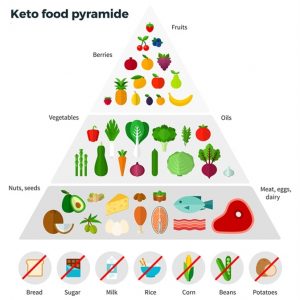Going Keto is Not Quick, it Takes Time, but It Works Well: A How To Guide
Hey there! If you’re reading this, chances are you’re interested in the ketogenic diet. Congratulations, you’ve made a fantastic decision for your health and well-being! However, going keto is not a quick fix. It takes time for your body to adapt to burning fat for fuel instead of glucose, but trust me, it’s absolutely worth it. Here’s a how-to guide to help you along the way.
1. It’s all about balance: Keep your carbs low, but don’t forget about your protein and fat intake. A good ratio to aim for is 70% fats, 25% protein, and 5% carbs. Use a tracker like MyFitnessPal to keep track of your macronutrient intake.
2. Pay attention to your carbs: Avoid processed foods and stick to whole, natural foods. Be mindful of hidden carbs in sauces, dressings, and condiments. Make veggies a priority, but choose lower-carb options like leafy greens, broccoli, cauliflower, and zucchini.
3. Hydrate, hydrate, hydrate: Drink plenty of water throughout the day to prevent dehydration. This is especially important on keto, as your body is using up more water than usual to flush out ketones.
4. Don’t skimp on salt: When you first start keto, you may experience the “keto flu,” which can cause headaches, fatigue, and other unpleasant symptoms. This is often caused by a lack of electrolytes, particularly sodium. Increase your salt intake or try an electrolyte supplement to feel better.

5. Be patient: It can take your body anywhere from a few days to a few weeks to adapt to the ketogenic state. Don’t get discouraged if you don’t see results right away. Give your body time to adjust, and you’ll start seeing benefits soon enough.
6. Move your body: Exercise is always a good idea, but it’s especially important on keto. Regular physical activity can help you achieve and maintain ketosis and improve your overall health and well-being.
7. Be prepared: Meal prep is key to success on the ketogenic diet. Plan your meals ahead of time and batch cook when possible. This will help you avoid the temptation to reach for processed or high-carb foods in moments of hunger.
8. Get enough sleep: Sleep is crucial for your body to function properly. Aim for 7-9 hours of quality sleep per night to help your body adapt to keto and keep your hormones in check.
Remember, going keto is not a one-size-fits-all approach. Everyone’s body is different, so listening to yours is important. If something doesn’t feel right, talk to your doctor and make adjustments as needed.
With patience, persistence, and a positive attitude, you can achieve your goals on the ketogenic diet. Good luck, and happy keto-ing!











